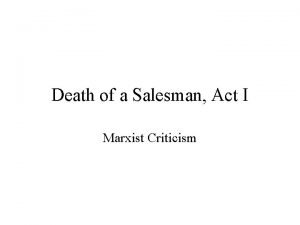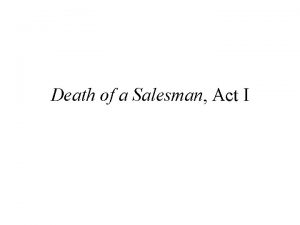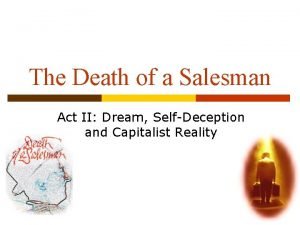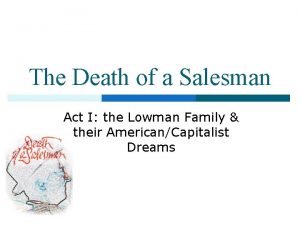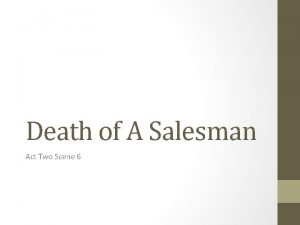Death of a Salesman Act I Marxist Criticism






- Slides: 6

Death of a Salesman, Act I Marxist Criticism

Grade Sheet for Essay 2 • Organization (10 points) – Does the paper have a clear thesis statement that is supported by the body paragraphs? – Does the paper use appropriate transitions and read smoothly? • Use of Quotations/MLA (20 points) – Are quotations appropriate in length and correctly formatted? – Are quotations used to support the paper's thesis? – Is works cited page present and correct? • Response to Prompt/Analysis (60 Points) – Does the paper effectively respond to the prompt in a thoughtful, thorough manner? – Are claims cohesive, well-explained, and adequately supported by analysis and evidence from the text of the poems? • Proofreading/Presentation (10 points) – Is the paper neat and free of errors? – Is the paper formatted correctly? (100 points total)

What is Marxist Criticism? • We already learned about how psychoanalytic theory applies the field of psychology to the study of literature. Similarly, Marxist Criticism applies political science and economics to the study of literature. • Grew out of the writings of Karl Marx, who was highly critical of the capitalist system and concerned about the ways in which governments and businesses that control the means of production (factories, etc. ) exert control over the working classes. • Marxist Criticism is concerned with issues of class conflict, wealth, work, and the various ideologies that surround these things. (An ideology is a group of ideals/values and ideas, especially one that forms the basis of a political of economic system. )

Questions Marxist Critics Ask: • How do issues of social class and economic status affect the characters and events in this work? • Are characters aware of the economic and political forces that are acting on them? • What ideological assumptions about class and economic status does this work make? • In what ways does this work either challenge or support the class or political structures it describes?

Questions for Death of a Salesman, Act I • What kind of a man is Willy Loman? Pick a few lines in the first act that are revealing about his character. What is the significance of his name? Can you think of any other significant names in this play? • This play is full of complicated family relationships. What is Willy's relationship like with his sons? With his brother? His wife? Point to some lines that illustrate these relationships. • This play has an interesting way of dealing with time. Pick a section of one of the "flashback" sequences to reread carefully. How does the bit of the past you chose illuminate the events going on in the "present"? (The first longer flashback starts on p. 882 at the top, and several more follow. The scene with Uncle Ben starts on p. 891. )

Applying Marxist Criticism to Death of a Salesman • What social and economic issues are at work on the Loman family? • What assumptions do these characters make about social class and money? What, for them, is essential for financial success and happiness? (Different characters will have different answers… consider Willy's emphasis on business and being liked vs. Biff's desire to be outside and making things. ) • In what ways does this play challenge or support the system that it describes? What comment do you feel the play is making about American business and capitalism? How did you feel about that system after reading this first act? Is this a critique of the idea of the "American Dream"?
